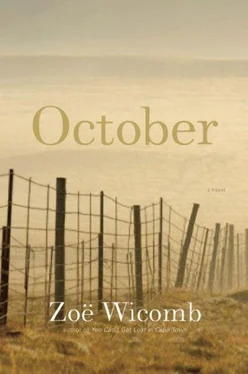Sylvie giggles. She supposes God could not very well give her a boychild, and one with horns to boot, to slaughter instead. You do know the Bible story of Father Abraham and the sacrifice of Isaac, don’t you? she asks, and Mercia nods curtly.
Sylvie does not speak of her fears for Bleskop, who sooner or later will have to be slaughtered. It was not as if she herself did not eat mutton, but not yet, she prayed, not even for the grand sister from overseas could she bring herself to do it. She had, of course, to ask Jake if she should slaughter for Mercia’s visit, but Jake, rude as ever, snarled, Just keep your hands off my sister, she’s got nothing to do with you. Do what you like with your fucking sheep. Uncouth, that is what he has become, so she gave herself permission to save the sheep. Instead, she would rise early to make a fire and cook the roosterbrood, which, it turns out, does not please Madam. Unless, and she glances sidelong at Mercia, she really is clever enough to see through the substitution.
It’s so much trouble, she explains, forgetting that she is echoing Mercia on sourdough. The business of slaughtering, I mean, when you could just buy from the butcher. I hope you don’t mind, she adds timidly. Lodewyk’s mutton is good, comes from the same local Namaqua sheep.
Mercia has no idea what she is talking about. No, of course not, she says. Whatever the problem is, she does not want any further trouble for the girl, whose sadness is barely hidden in all this prattle about sheep. Mercia says that she is there to help, to see what could be done to relieve the burden. How will they sort out Jake’s problem? she asks.
Sylvie, it seems, is not ready to speak of Jake. She laughs. Look, she says, pointing to the field. The dam must have made herself scarce, for the stupid lambs bleat loudly, disconsolately, until the mother popping up from a donga can take no more and baa-baas in return. All right then, come along, she baa-baas, and then the whole aggressive business of feeding starts all over again, the tugging at the teats.
I could watch them all day, Sylvie says, I know their bleats as well as their mother does. That pair, and she points, had some trouble being born. Had to pull the second one out myself, she says with pride. It will be very hard to slaughter those.
You don’t do it yourself, the slaughtering, do you? Mercia asks with a shudder.
Yes, of course, I wouldn’t let anyone else kill my lambs. Learned when I was young. Didn’t you, from your father? Meester, Pa, used to slaughter, and when I was a child I used to help, holding a leg for the chopping off of the head.
Mercia finds this talk horrible, but suspecting that Sylvie thinks her a namby-pamby, she looks the girl resolutely in the eye as Sylvie speaks of kneading away with your fist the skin from the carcass.
Not at all difficult, and a nice, hissing sound, Sylvie says. Then, of course, I was sent to work in Lodewyk’s butchery. If you want to eat it you should be able to do it yourself, that’s what I always say.
It is this, Mercia thinks, the sanctimonious nonsense that makes her vacillate wildly for and against Sylvie. For all her belief in female solidarity, she simply cannot take to this girl. As for the snobbery that Jake attributes to her, well, at least it is not the whole story. She is relieved when Nicky turns up, gamboling too, like a lamb. Hurry, Sylvie calls out to him. We have to drive the sheep over the hill, into the next camp. This patch has been eaten and trampled bare.
The little boy frowns. A man, he says, could just run into the midst of them and shout and frighten the daylights out of them. Then we’ll see them jump over the fence. A man could get a big stick.
A man? Mercia repeats with distaste.
Oh yes, his mother smiles, already he thinks he’s a little man.
I wouldn’t encourage that, Mercia retorts, and turning to the boy says that being mannish and frightening animals with sticks is not humane, is not what good people do. She’d rather he be a decent little boy.
His mother says nothing, smiles, and pats the boy’s head as if to say that he should not mind his auntie, that the woman for all her supposed cleverness knows nothing of either children or sheep.
Mercia spends most of the day in her room reading and writing. Although there are several articles she ought to look at, she wishes she had brought along the novel, Home , to read again. The strange room is unsettling; she cannot start a new chapter; instead, she revises again an earlier one. If Jake is not ready to see her, she has no intention of wasting her time, although her patience is wearing thin. To stretch, she steps out and finds the girl flustered, waiting to speak to her. Why did she not knock? But Sylvie ignores the question. She says that she will have to leave for work in the next ten minutes. Jake is still asleep so she can’t leave Nicky. She’ll take him to her AntieMa, perhaps Mercia remembers her old aunt? Mercia nods. Sylvie has run out of time, so Mercia must please find herself something to eat for lunch in the fridge, and perhaps get something for Jake as well. He eats so little, perhaps he could be persuaded by her.
It is preposterous. Mercia takes in the neatly pressed hair, the memory of a bruise yellowing below her left eye. Nonsense, she says, I’ll wake Jake; of course he should look after the boy.
Oh no, the girl begs, please, and her voice is strained. He’ll be in a black mood if he doesn’t sleep it all off; please I couldn’t leave the child when he’s like that.
So Mercia relents. Fine, she says, but you’re making it difficult for yourself. Look, I’m here; I’ll stay with Nicky. No really, she says as Sylvie looks doubtfully toward the room where Mercia has been working. I can do that any other time. No problem in taking the afternoon off, and you can rely on me to give Jake a talking-to when he deigns to get up.
Mercia has a vague memory of Sylvie’s auntie, by now surely an old woman who could not run after a child wagging his tail. Besides, that is no way to raise a child — the scolding and shouting of country folk.

Sylvie was raised by her parents, Ma and Pappa, and the sisters, AntieMa, Nana and Ousie, who all lived in a ramshackle little house at the edge of the location. Pappa had been injured in the gypsum mine, so he limped about the homestead, growling and sucking at his pipe while he tended goats and grew pumpkins. Ma shuffled through the dark rooms, her head swaddled in two large doeke tied the old-fashioned way in an invisible knot above her left ear so that her long, withered neck seemed unable to carry the weight.
Ma was sick with a permanent bad head brought about by disappointment, which was why she was sad and cross and wary of sin. And why they all had to walk on tiptoe. She had already reached her fifty-eighth year and was waiting for the Goodlord to fetch her. The child had in mind an outing that would make Ma laugh, or at least smile, one that you earned after fifty-eight years of pursing your lips. It would be like the olden days that Ma spoke fondly of, a trip to the town with her legs swinging carefree from the side of the mule-drawn cart, her top doek flying in the wind, with the Goodlord merrily cracking his giddy-up whip. That would be why Ma so looked forward to being fetched.
To help Ma overcome disappointment, Sylvie pounded tobacco into a rough snuff. The old woman inhaled, pinching each nostril in turn, then she would sneeze and blow her nose into large khaki handkerchiefs that the child washed on Saturdays. As Sylvie grew older she undid Ma’s doeke in the evenings, combed and plaited her short hair into little horns, no matter that they would be lumpy under the doek, for there would be the second cloth to smooth them over, but still Ma did not smile at her like a real mother. Instead she issued warnings against sin and urged the child to be frugal.
Читать дальше













